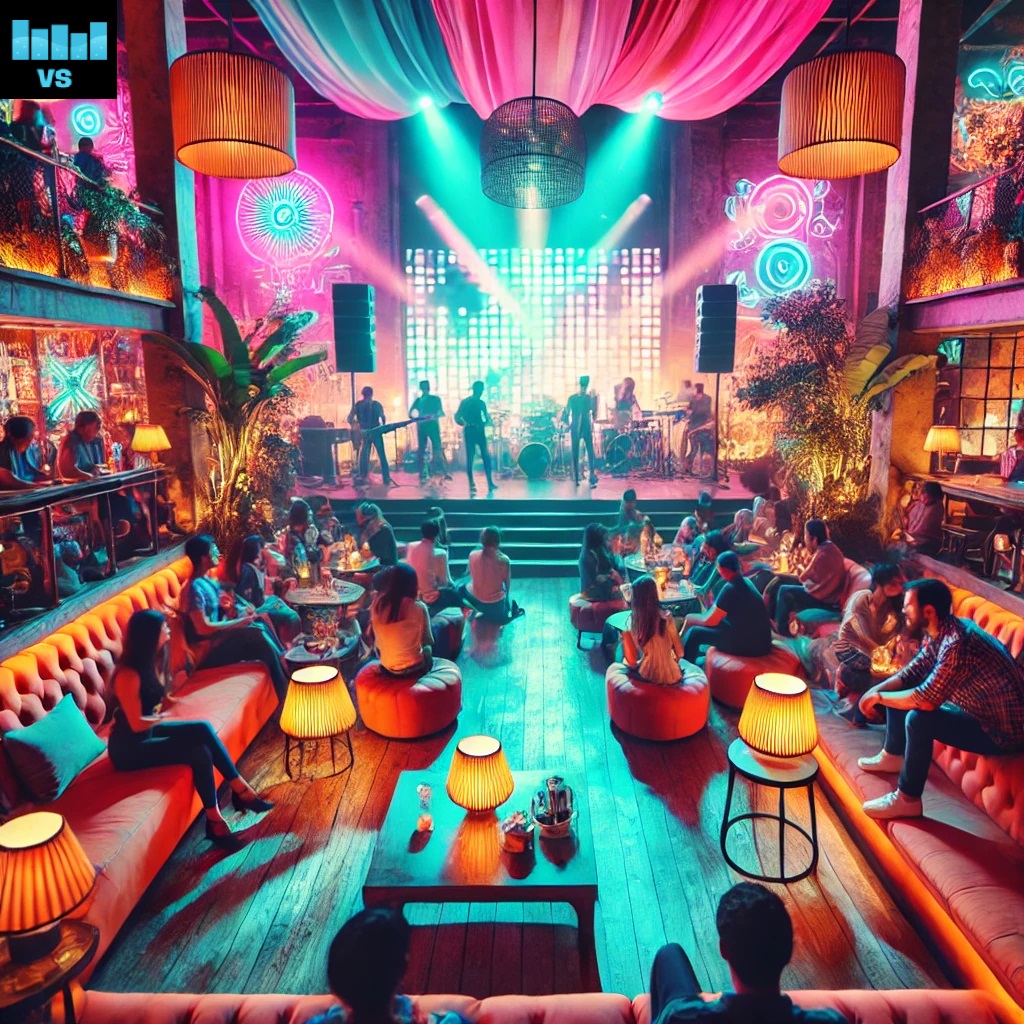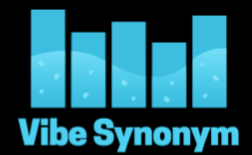Vibe Synonym: The Best Alternatives to Describe Atmosphere & Energy
When you hear the word “vibe,” it often refers to the mood, atmosphere, or overall feeling of a situation, place, or person. But what if you need another way to say it? In this article, we’ll explore the best vibe synonyms that you can use in different contexts.

What Does “Vibe” Mean?
“Vibe” is a casual and modern term often used to describe an overall feeling or emotional atmosphere. It can refer to the energy a person gives off, the mood of a room, or even the impression a song creates. If you’re looking for a vibe synonym, this guide will help you find the perfect alternative.
Best Synonyms for Vibe
Here are some of the top vibe synonyms and how to use them effectively:
1 Ambience (A Common Vibe Synonym)
Definition: The mood, atmosphere, or character of a place, often influenced by lighting, decor, sounds, and overall design.
Example: “The restaurant had a romantic ambience with soft lighting, warm colors, and the soothing melodies of live jazz music. The intimate setup made it perfect for couples seeking a cozy evening.”
Ambience plays a significant role in shaping people’s experiences, whether it’s in a restaurant, café, event, or even an office space. A well-curated ambience can evoke feelings of relaxation, excitement, or comfort, depending on the desired effect. For instance, bright lights and upbeat music create a lively environment, while dim lighting and soft melodies are more suited for tranquil and intimate settings.
2. Aura (A Powerful Vibe Synonym)
Definition: A distinct atmosphere, energy, or feeling that seems to surround a person, place, or thing, often perceived on an emotional or intuitive level.
Example: “Her confident aura made her stand out in any room, commanding attention without even speaking a word.”
An aura can be positive, radiant, and uplifting, or it may be intense, mysterious, or intimidating. People are often drawn to those with a warm, approachable aura, while a powerful and commanding aura can convey strength and authority. Auras are also sometimes described in spiritual or metaphysical contexts, with different colors representing various emotional or personality traits.
3. Energy (A Dynamic Vibe Synonym)
Definition: The emotional, mental, or physical quality that someone or something emits, often influencing the mood or atmosphere around them.
Example: “The concert was full of high-energy performances, with electrifying music and a crowd that danced the night away.”
Energy can manifest in various forms, from the vibrant and dynamic energy of a bustling event to the calm and serene energy of a tranquil retreat. Positive energy uplifts those around it, fostering enthusiasm, creativity, and connection. In contrast, negative energy can create tension, discomfort, or even drain the mood of a room.
In social situations, people often radiate energy based on their emotions and confidence levels. A charismatic speaker might energize an audience, while a disinterested participant might dampen the atmosphere of a discussion. Similarly, physical spaces can also have energy. For example, a gym typically has high-energy vibes with music pumping and people actively working out, while a meditation center radiates a calming, peaceful energy.
4. Mood (A Descriptive Vibe Synonym)
Definition: The overall feeling or emotional atmosphere of a place, situation, or environment that influences how people perceive and interact with it.
Example: “The coffee shop had a relaxing mood, perfect for studying.”
Mood refers to the emotional tone of an environment, which can affect how people feel and behave. It can be influenced by elements like lighting, sounds, and the presence of others. A lively, cheerful mood might fill a busy street, while a peaceful mood may dominate a quiet park. Moods can be uplifting, calming, or even tense, and they shape our experiences in various settings. Whether it’s a serene room or an energetic event, the mood helps define how we connect with our surroundings and each other.
5. Tone (A Stylistic Vibe Synonym)
Definition: The general attitude, character, or emotional quality conveyed through words, style, or atmosphere.
Example: “The movie had a dark and suspenseful tone.”
Tone refers to the underlying attitude or emotional quality of something, whether it’s a piece of writing, a conversation, or even a visual setting. It sets the mood for how something is perceived and helps convey the intended message or feeling. For example, a novel with a lighthearted tone might evoke feelings of joy and comfort, while one with a serious or tense tone may provoke reflection or suspense. Tone is often determined by factors such as language choice, pacing, and imagery. Just as in film or music, where the tone influences how the audience feels, it plays an essential role in shaping our emotional response to various forms of communication.
6. Atmosphere (A Versatile Vibe Synonym)
Definition: The surrounding mood, feeling, or emotional environment of a place.
Example: “The cozy atmosphere of the cabin made it a perfect winter retreat.”
Atmosphere refers to the emotional or sensory environment that surrounds a place, event, or situation. It is shaped by factors like lighting, sounds, decor, and the people present. A warm, welcoming atmosphere might fill a home during the holidays, while a cold, sterile atmosphere could be found in a hospital or office. The atmosphere of a location sets the tone for the experience, influencing how people feel and interact within it. Whether it’s intimate, lively, or relaxing, the atmosphere plays a key role in defining the vibe of a space or event.
7. Impression (A Perceptive Vibe Synonym)
Definition: The perception or feeling that something or someone conveys.
Example: “The modern decor gave the office a professional impression.”
Impression refers to the initial or lasting perception formed based on what is seen, heard, or experienced. It’s the feeling or idea that something evokes in someone’s mind. For example, a stylish, organized space might give a professional impression, while a cluttered, chaotic environment might convey the opposite. Impressions are often shaped by details like appearance, behavior, or the overall mood of a situation. They play a crucial role in first encounters and can influence how we connect with others or interpret a place.
How to Choose the Right Vibe Synonym
- For describing places: Use ambience, atmosphere, or mood as your preferred vibe synonym.
- For describing people: Use aura, energy, or tone to match the right vibe synonym.
- For describing events or media: Use tone, energy, or impression as the most fitting vibe synonym.
Conclusion
Using the right vibe synonym can make your writing more expressive and engaging. Whether you’re describing a place, a feeling, or a person’s energy, the perfect word is out there. Keep experimenting with these vibe synonyms to add variety to your language!
FAQS
1. What does “vibe” refer to?
“Vibe” describes the mood, atmosphere, or overall feeling of a place, person, or situation.
2. Which vibe synonym works best for places?
For describing places, words like “ambience,” “atmosphere,” or “mood” are fitting alternatives.
3. What’s a good synonym for describing a person’s energy?
“Aura” and “energy” are ideal synonyms when referring to someone’s vibe.
4. Are vibe synonyms appropriate for events or media?
Yes, “tone,” “energy,” and “impression” work well when discussing events or media content.
5. Why should I use vibe synonyms in writing?
Using varied synonyms for “vibe” helps make your writing more dynamic and expressive.
